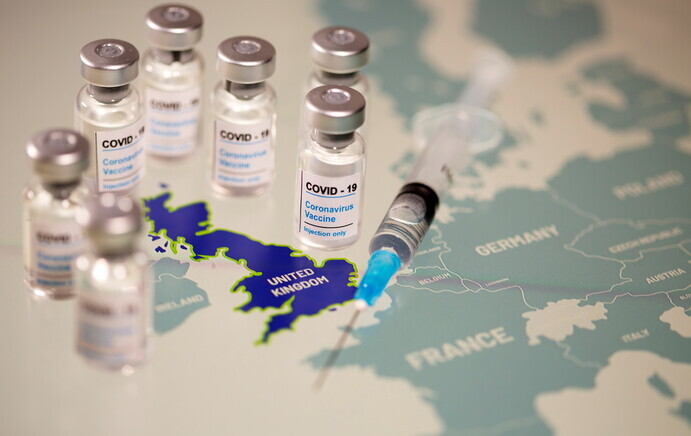hankyoreh
Links to other country sites 다른 나라 사이트 링크
[Column] Anti-vaxxers and bullshit on social media

COVID-19 vaccines with proven efficacy are emerging. The UK is set to begin inoculating people this week after granting emergency approval on Dec. 2 for a vaccine co-developed by Pfizer and BioNTech. The US, which has been the country hardest hit by the virus, also plans to begin vaccinations within the year, but it is running into anti-vaxxing campaigns. According to a survey conducted in September by the Pew Research Center, 49% of American adults said they would not undergo vaccination.
The ravages of anti-vaccination attitudes have been observed in the case of measles. The US, the UK, and other countries have seen major resurgences of measles due to distorted information portraying the vaccination as a cause of autism. In 2018, the World Health Organization (WHO) warned against anti-vaccination campaigns prevalent in certain wealthy countries, noting that the number of people infected with measles globally had grown by over 50% from a year before.
Claims that vaccines cause infantile autism have made the rounds on social media, with posters noting the proximity in time between vaccinations and autism diagnoses. In terms of the timeline, the measles vaccine is first administered around the child’s first birthday, while the time when symptoms of autism first appear is generally around the stage after vaccination when the child is learning to walk.
In South Korea, certain news outlets have fanned anti-flu vaccine arguments and fears, noting deaths that occurred among people who had been vaccinated. Last fall, there were over 100 cases of people dying within days of receiving a flu vaccine; in none of those cases was a clear connection with the vaccine established. This kind of situation — with media spreading baseless claims and false information rather than verifying the facts in their reporting — is enough to make one pessimistic about the battle against fake news.
While fact checking is also on the rise, research shows that even the most popular fact checking articles fall short of the mass appeal of fake news. In July, the Washington Post published an analysis in which it concluded that US President Donald Trump had lied or made statements contrary to fact 20,055 times in the three years and six months since he took office. He spread the equivalent of 15.8 pieces of false information every day on average, yet in the last presidential election he received the highest vote total for any Republican Party candidate in history.
James Ball, author of the book “Post-Truth: How Bullshit Conquered the World,” conducted an economic analysis of these falsehoods in terms of their cost. While it is very easy to generate interest and profit on social media by manufacturing lies, it’s very costly to scrutinize and disprove them. The message is that the media and public should try not to pay any attention at all to the bullshit — but in the social media environment, that’s becoming increasingly difficult to manage.
By Koo Bon-kwon, senior staff writer
Please direct comments or questions to [english@hani.co.kr]

Editorial・opinion
![[Editorial] Korea must respond firmly to Japan’s attempt to usurp Line [Editorial] Korea must respond firmly to Japan’s attempt to usurp Line](https://flexible.img.hani.co.kr/flexible/normal/500/300/imgdb/original/2024/0514/2317156736305813.jpg) [Editorial] Korea must respond firmly to Japan’s attempt to usurp Line
[Editorial] Korea must respond firmly to Japan’s attempt to usurp Line![[Editorial] Transfers of prosecutors investigating Korea’s first lady send chilling message [Editorial] Transfers of prosecutors investigating Korea’s first lady send chilling message](https://flexible.img.hani.co.kr/flexible/normal/500/300/imgdb/original/2024/0514/7917156741888668.jpg) [Editorial] Transfers of prosecutors investigating Korea’s first lady send chilling message
[Editorial] Transfers of prosecutors investigating Korea’s first lady send chilling message- [Column] Will Seoul’s ties with Moscow really recover on their own?
- [Column] Samsung’s ‘lost decade’ and Lee Jae-yong’s mismatched chopsticks
- [Correspondent’s column] The real reason the US is worried about Chinese ‘overcapacity’
- [Editorial] Yoon’s gesture at communication only highlights his reluctance to change
- [Editorial] Perilous stakes of Trump’s rhetoric around US troop pullout from Korea
- [Guest essay] Preventing Korean Peninsula from becoming front line of new cold war
- [Column] The state is back — but is it in business?
- [Column] Life on our Trisolaris
Most viewed articles
- 1Major personnel shuffle reassigns prosecutors leading investigations into Korea’s first lady
- 2[Editorial] Korea must respond firmly to Japan’s attempt to usurp Line
- 3[Editorial] Transfers of prosecutors investigating Korea’s first lady send chilling message
- 4US has always pulled troops from Korea unilaterally — is Yoon prepared for it to happen again?
- 5[Column] Will Seoul’s ties with Moscow really recover on their own?
- 6Korea cedes No. 1 spot in overall shipbuilding competitiveness to China
- 7Korean opposition decries Line affair as price of Yoon’s ‘degrading’ diplomacy toward Japan
- 8For prestigious university admission, S. Korean students and parents in a war for information
- 9Exchange rate, oil prices, inflation: Can Korea overcome an economic triple whammy?
- 10[Editorial] Perilous stakes of Trump’s rhetoric around US troop pullout from Korea